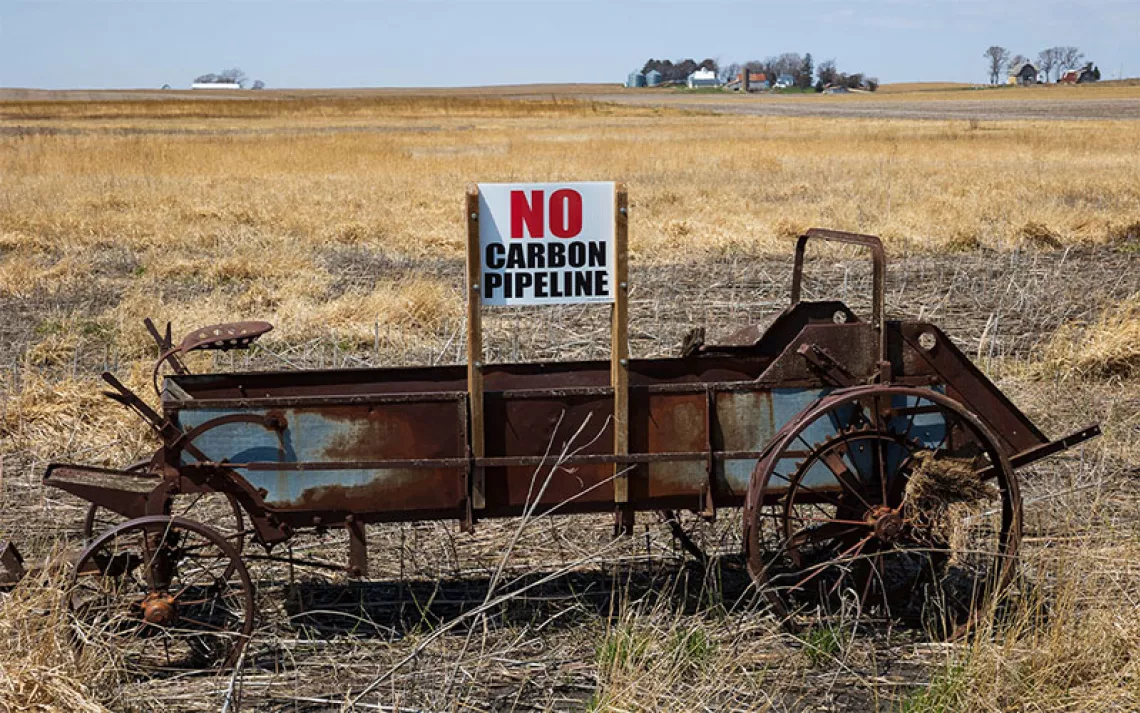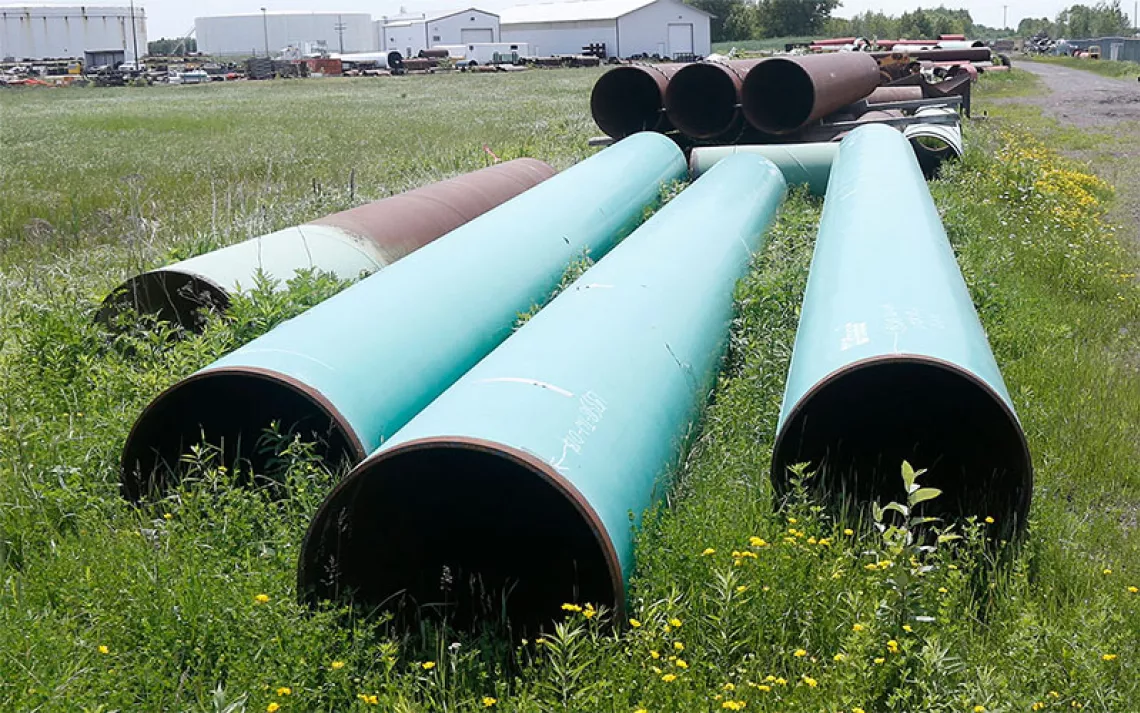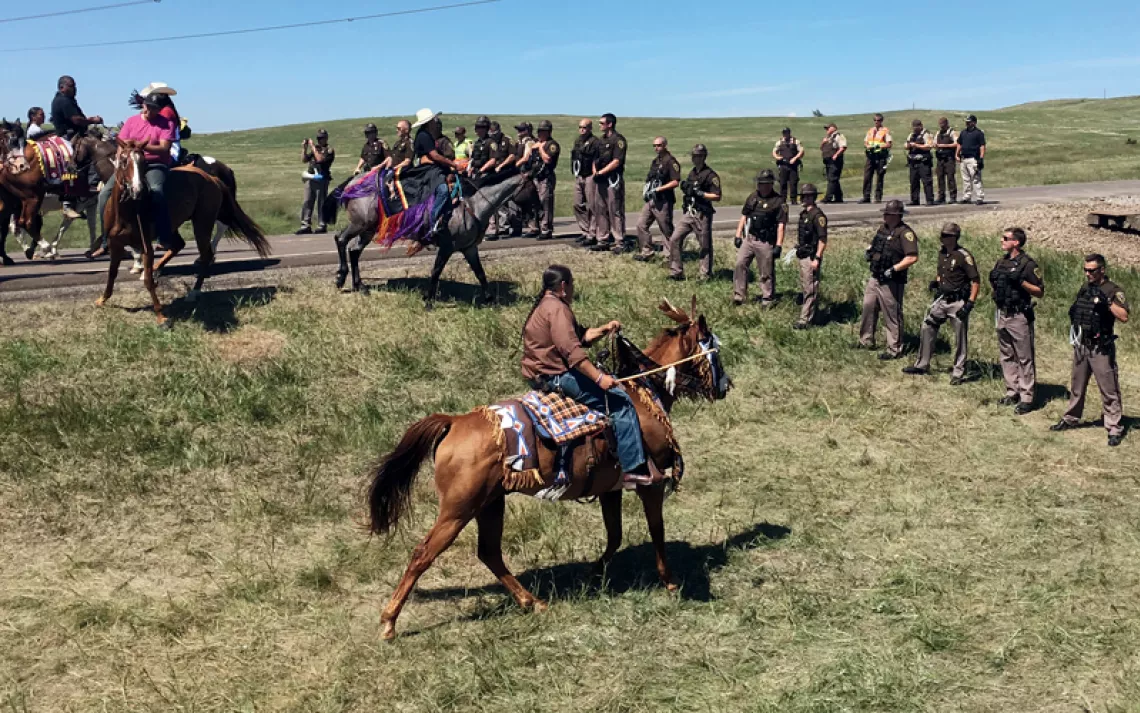Native Americans, Environmentalists Notch Another Pipeline Victory
Michigan governor moves to close the Line 5 oil and gas pipeline

Photo by Dale G Young/The Detroit News via AP
When Bryan Newland heard the news that Michigan governor Gretchen Whitmer was revoking a crucial easement for the controversial Enbridge Line 5 oil and gas conduit that runs beneath the Straits of Mackinac, he could barely believe it. Newland is chairman of the Bay Mills Indian Community, an Anishinaabe township on the shore of Lake Superior, and for years his community has been working with environmentalists to shut down the decades-old pipeline, which they say poses a risk to the health and water quality of the Great Lakes. After all those years of grassroots activism, the announcement came as a happy shock.
“It definitely came as a surprise, not because there was any cynicism about the governor, but these types of things just don’t happen very often,” Newland said of the November 13 governor’s decision. “Those of us who spend our careers advocating for marginalized people take it on the chin a lot more than we land a punch. When I got the phone call from state officials, I was speechless. It was like ‘does not compute.’ But I was very happy, and when I spoke with our team at Bay Mills, lawyers and staff who have been involved in fighting this longer than I have, that was an emotional conversation. In this type of work, there’s a constant effort to roll a rock up a hill, and it often feels like you’re never going to get there.”
The Line 5 pipeline moves millions of barrels of oil and gas annually beneath the waters of the Straits of Mackinac, which connects Michigan’s lower and upper peninsulas. The Straits of Mackinac are sacred territory to Native American groups, and they have long fought for Line 5 to be shut down. Environmental activists have also been longtime opponents of the pipeline’s continued operation, noting that if the 67-year-old pipeline burst, the resulting oil spill would be catastrophic for the Great Lakes, which supply water to nearly 50 million people in surrounding states and in Canada and are the largest group of freshwater lakes on Earth.
The Michigan governor revoked the easement for Canadian fossil fuel company Enbridge’s violation of the public trust doctrine, and in her decision cited the “unreasonable risk” that continued operation of the pipeline poses to the Great Lakes. Whitmer also noted what she called Enbridge’s “persistent and incurable violations of the easement’s terms and conditions.” With its easement now terminated, Enbridge is required to cease Line 5 operations by May 2021.
“As Michiganders, we are defined by the Great Lakes, and we will be remembered by how we stood up for these waters that hold 21 percent of the planet’s fresh surface water,” Christy McGillivray, the legislative and political director for the Sierra Club’s Michigan Chapter, said in a statement. “[The] action to revoke the 1953 easement by the governor … is a reaffirmation of our state’s commitment and duty to protect this precious resource in the public trust.”
Liz Kirkwood, executive director of For Love of Water, a Traverse City, Michigan–based environmental group that has been a longtime opponent of the pipeline, said that the process of formally revoking the easement began in June 2019, when Michigan attorney general Dana Nessel filed a lawsuit to revoke the easement under public trust laws and Whitmer directed the Michigan Department of Natural Resources to evaluate the easement violations.
“It was kind of like the other shoe finally dropped,” Kirkwood said of the recent announcement. “The state determined that this was the only course of action for a company that has dragged their feet at every turn, deceived the public, and deceived state and federal regulators.”
In a statement, Michigan DNR director Dan Eichinger said, “After spending more than 15 months reviewing Enbridge’s record over the last 67 years, it is abundantly clear that today’s action is necessary. Enbridge’s historic failures and current noncompliance present too great a risk to our Great Lakes and the people who depend upon them.”
Opponents of the pipeline for years have argued that the pipeline’s age, along with the damage it has incurred over the years from ships in the Straits, poses serious danger to the Great Lakes. The pipeline has been struck and damaged multiple times by ships’ anchors, including as recently as 2018 and 2019. Enbridge is also responsible for a 2010 oil spill near Marshall, Michigan, that let loose more than 800,000 gallons of oil into Talmadge Creek, a tributary of the Kalamazoo River, after a pipeline in western Michigan ruptured. In their decision, state officials also noted that Enbridge hasn’t satisfied conditions of operating that include ensuring that pipelines are physically supported at least every 75 feet, are covered by multilayer corrosion-prevention coatings, and are within certain curvature limitations.
But Line 5’s age has also been one of the biggest things working in Enbridge’s favor. In 1953, laws and regulations didn’t exist that today would’ve likely prevented a pipeline like it from being built. Newland noted that maintaining the status quo has been the policy of previous administrations in Michigan, who tried to find a middle-of-the-road position between Enbridge and environmental activists and Native communities fighting for the shutdown of Line 5.
“The status quo really worked in Enbridge’s favor,” Newland said. “(This decision) is really a credit to my constituents and others who would not let this issue die.”
Matthew Fletcher, director of Michigan State University’s Indigenous Law and Policy Center, said that such a bold decision from Whitmer suggests that the state feels it has a strong legal case against any challenges Enbridge might bring in response.
“My sense is that [Michigan] governors for a long time have tried to stay in that middle ground on this issue,” Fletcher said. “This suggests that the state could know more about what’s going on in terms of operation of the pipeline and the cultural resources.”
Bridge Michigan, a nonprofit news and policy organization, talked with legal experts who also believe the state has the legal upper hand in the case. But that doesn’t mean challenges won’t happen. The Detroit Free Press reported that officials in Alberta, Canada, where Enbridge is located, are displeased with the decision.
Enbridge has long said that shutting down the pipeline would significantly increase energy costs for consumers. In a statement after Whitmer’s decision, the company said there “is no credible basis” for terminating the 1953 easement. Other prominent voices have come to Enbridge’s defense; the Detroit News wrote in an editorial that shutting down Line 5 is “bad for Michigan.”
Even as the company suffers a setback with its existing line, Enbridge still hopes to construct the Great Lakes Tunnel, a project that would relocate Line 5 into a newly constructed tunnel in the Straits. Although that project is not impacted by Whitmer’s order, the governor’s decision may bolster Native nations’ and environmentalists’ efforts to halt the tunnel through other legal challenges.
While Enbridge claims that the proposed tunnel will be a safer way to transport oil and natural gas, the company’s plans don’t address the critical issue of how the Straits are sacred to Native groups in the area.
“For the tribes, outside of COVID, this is quite possibly the most important issue,” Fletcher said. “It is an existential crisis for these tribes. For them, it’s everything. They’re going to raise it again and again and again, and just constantly keep it on the radar.”
Environmental groups are similarly committed to continuing to fight any proposals to keep moving oil and gas beneath the Straits.
“We’ve had a wonderful partnership with our Indigenous friends,” Kirkwood said. “It’s the combination of public trust law and sovereign treaty rights that protect paramount interests of natural resources and protective uses of commerce, recreation, drinking water, as well as treaty rights. We have made the case for why and how it can be shut down. So, the future is about working with all of our amazing partners to help defend the governor’s and attorney general’s legal actions.”
Newland said that in the coming months, the Bay Mills Community’s lawyers will remain on the lookout for opportunities to keep up their fight.
“We have a very clear-eyed understanding that this isn’t the end of the road; this is the beginning of the end of the road,” Newland said. “Enbridge is not going to take this lying down, they’re going to fight in court. They’re going to continue to push for a tunnel underneath the Straits. We’re going to continue to make the case as to why that is a risk to us as a tribe and the other tribes who have treaty rights here in northern Michigan.”
He continued, “Just from a public policy standpoint, the governor’s decision was the right decision. This particular pipeline is the height of stupidity. Why would you jeopardize the largest body of freshwater on the planet for this project? No one would build this from scratch today if someone proposed it, so why allow it to continue?”
 The Magazine of The Sierra Club
The Magazine of The Sierra Club



